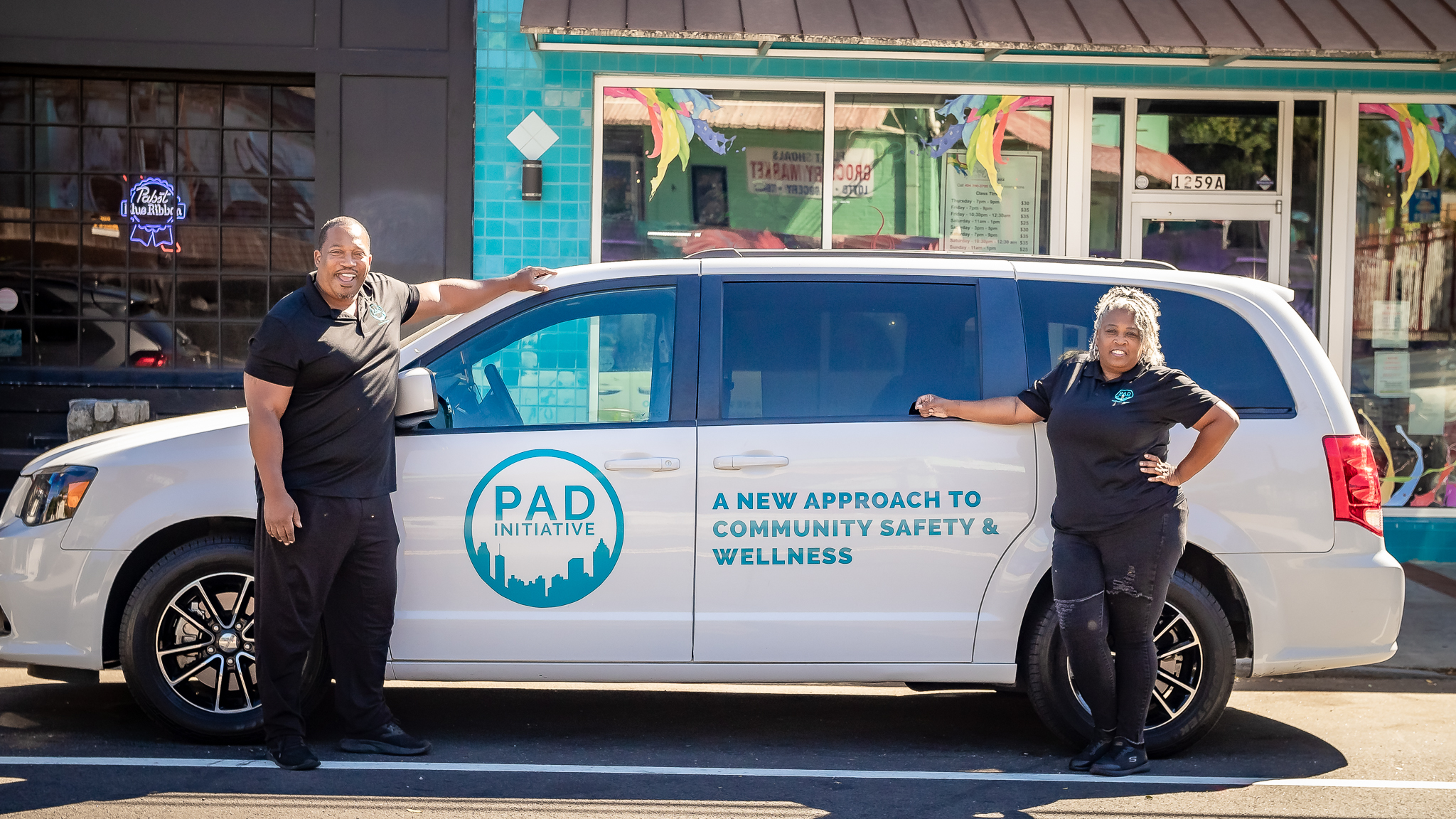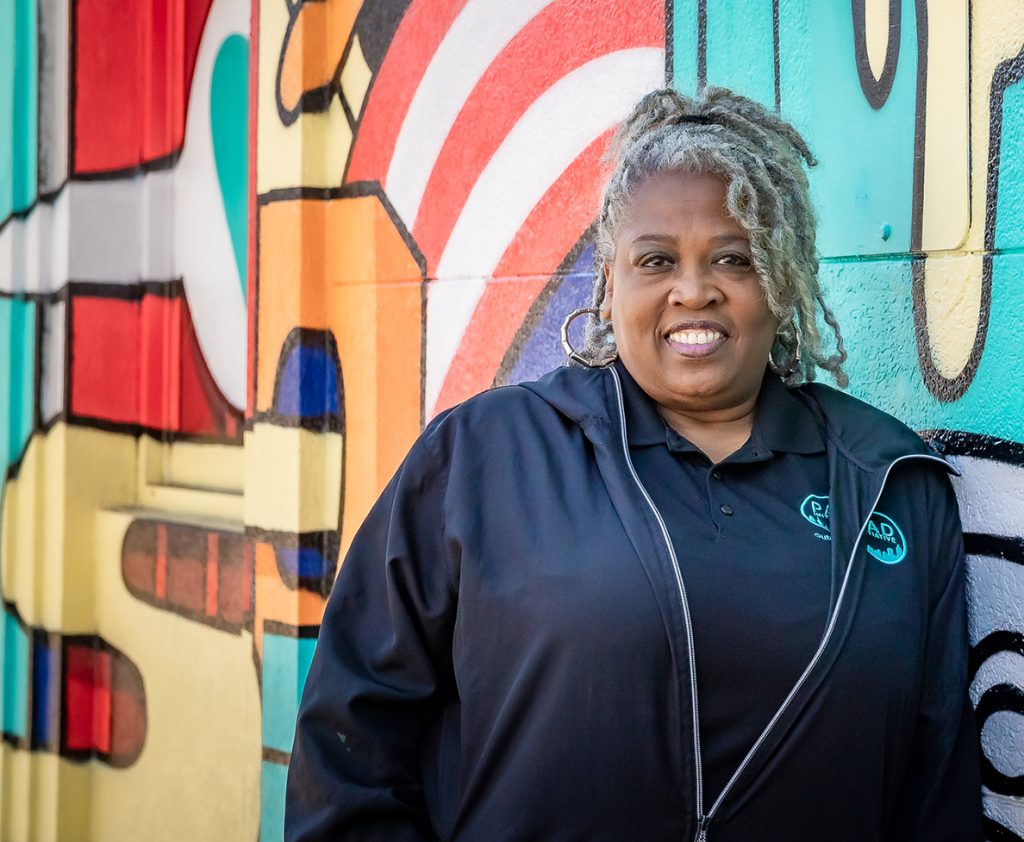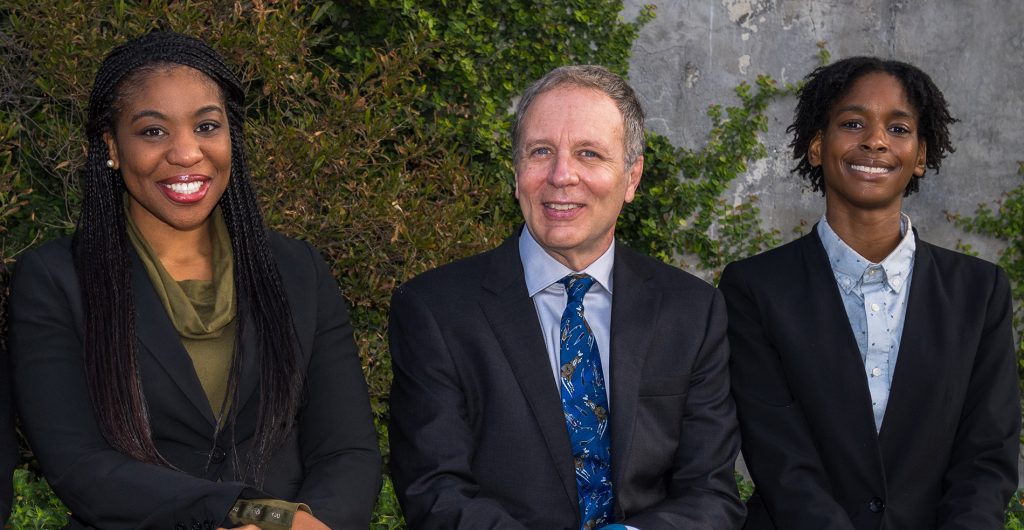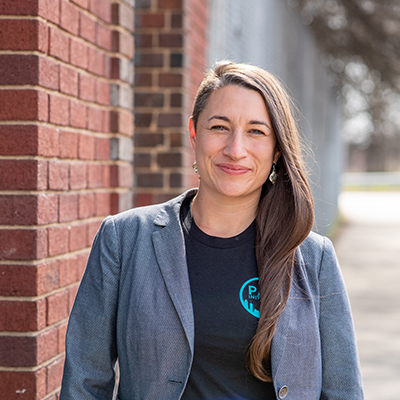
How communities are creating more equitable justice systems with a focus on mental health
A resident in an Atlanta neighborhood was worried about the well-being of a woman panhandling near a bank with three kids in tow. In many places, calling 911 is the only option for getting immediate help for such behavioral or quality-of-life issues as homelessness, substance abuse and mental health concerns.
But the person called 311, Atlanta’s non-emergency line. Instead of a police response, which can sometimes intensify situations, the call brought Stacy Piper, a community engagement specialist from the nonprofit Policing Alternatives & Diversion Initiative (PAD). Piper gave the woman food and water and talked with her to learn she was raising money for a hotel room. She connected the woman with a case manager, who helped the woman find permanent housing.
“That’s where our team really shines,” says Moki Macias, executive director of PAD. “We show up differently than law enforcement, where situations can escalate and someone ends up with a low-level charge and lands in jail. We are trying to shift the response from one of enforcement to one of care.”

“People who are in crisis situations need a listening ear, compassion and assistance that cater to people with person-centered solutions,” says PAD community engagement specialist Stacy Piper, pictured. “I heard a saying that applies perfectly to the work of PAD: ‘We are just ordinary people who support ordinary people who are people like us.’” (photo by DV Photo Video)
PAD’s diversion program works in partnership with the Microsoft Justice Reform Initiative, which supports organizations that are developing alternatives to arrest and incarceration, accelerating new models of public safety and working to expand access to data-driven insights.
“We recognize that people with mental health conditions and people in Black and African American communities have very different experiences in their interactions with the justice system,” says Merisa Heu-Weller, general manager of the Microsoft Justice Reform Initiative. “Our commitment is to advancing racial equity and fairness in the justice system so communities can thrive.”
Studies show that people with mental health disabilities are more likely to be arrested than those without disabilities. Repeat arrests are common for people facing extreme poverty, addiction and other issues often related to untreated mental health conditions. One in four people with a mental health condition has a history of arrest.
“When you’re talking about justice reform, you cannot reform the justice system without addressing disability equity, which includes community-driven solutions for engaging in times of mental health crisis,” says Ebele Okoli, who manages Microsoft Accessibility programs focused on mental health and innovation.
Race compounds the experience of people with disabilities, in which Black people in general are twice as likely to be arrested than white people in the U.S., according to an arrest trends dashboard built by the Vera Institute of Justice with Microsoft. A Cornell University study found that 55% of Black men with disabilities had been arrested by age 28. In contrast, less than 40% of white people with disabilities had the same experience. Racial disparities in mental health systems, from poor access to systemic bias, also negatively impact Black and African American communities.
We are trying to shift the response from one of enforcement to one of care.
With access to data and technology, nonprofits and local organizations are at the forefront of systemic changes. In Atlanta, PAD is analyzing thousands of arrests a month with a Microsoft Power BI dashboard that helps the organization understand policing trends. The dashboard helps PAD track data related to demographics, location, if a police officer or a 911 call initiated an arrest, and if an arrest led to a booking, citation or a criminal charge.
“Changing any system requires being able to understand what’s happening,” says Macias. “That’s where Microsoft really helps in terms of providing technical support. Being able to use data effectively drives our strategy and allows us to be part of broader policy conversations.”
PAD’s work is part of a larger justice reform initiative called LEAD, which helps jurisdictions reduce unnecessary arrests and prosecutions of people with unmanaged behavioral illnesses. Developed in Seattle in 2011 by a diverse coalition that included the Public Defender Association, LEAD provides a diversion and street-based case management model now used in more than 60 jurisdictions across the country and increasingly around the world.
“Many people recognize that there’s little benefit in repeatedly arresting and jailing people whose unlawful or problematic conduct stems from unmet behavioral health needs,” says Rebecca Brown, consulting expert for the LEAD Proof of Concept Project. The initiative is working to enhance the model’s efficacy in a diverse cohort of sites drawn from around the country.
“There are police officers who do not want to keep arresting people who are clearly in the throes of mental illness,” Brown says. “There are prosecutors looking at people in the courthouses thinking, ‘I don’t want to prosecute this person.’ They recognize that people are suffering and that criminalizing behavioral illness does nothing to address the needs that may be driving problematic conduct.”
But jurisdictions often struggle with inefficient data infrastructure that hinders their ability to create and sustain successful diversion programs. To help, the LEAD Proof of Concept Project is working with Microsoft to improve technical and data systems for the cohort sites, which include Atlanta. The goal is to develop technological solutions customized for the LEAD model and adaptable for individual places.
“Every LEAD site goes through its own learning curve, but they have commonalities,” says Brown. “Every site has police officers, prosecutors, case managers, homeless service providers. Every site needs to seamlessly share information across agencies for operational and analytical purposes while protecting privacy. So we’re developing a standardized technological framework normed to meet the LEAD model.”
In Los Angeles County, home to the largest jail population in the U.S., the Rapid Diversion Program is already having an impact. Based at six courthouses in the county, behavioral health specialists assess defendants for mental health diagnoses early in court proceedings and connect them with case management, treatment, housing and job opportunities. The voluntary, growing program doesn’t require a guilty plea and is available to people charged with non-violent misdemeanors or felonies. Cases are dismissed when a participant completes the program.
Our commitment is to advancing racial equity and fairness in the justice system so communities can thrive.
More than 200 people have finished the program since it began in 2019. About 96% of them have avoided further involvement with the justice system. More than 70% of eligible people who entered the program are Black, African American, Hispanic or Latinx.
“That is a stark difference from what you usually see with diversion efforts. Usually, due to restrictive rules of who is eligible for these programs, we see that people of color are left out and who you see in the programs are mostly white folks,” says Brett Taylor, senior advisor for West Coast Initiatives at the Center for Court Innovation. The New York-based nonprofit provides technical assistance to Los Angeles County, where more than 700 people are currently enrolled in Rapid Diversion.
For the program, the more inclusive eligibility makes access to treatment and social services more equitable and “can help mitigate the effects of years of over-policing in communities of color,” Taylor says. The organization also intentionally places the program in cities with large Black and African American communities, where a history of disinvestment has left a dearth of mental health services.

Center for Court Innovation staff and West Coast Initiatives team members Chidinma Ume, interim director of policy (left); Brett Taylor, senior advisor (center); and Oceana Gilliam, planner (photo provided by the Center for Court Innovation)
The Center partnered with Microsoft to support Los Angeles County’s capacity to collect data related to disparities and other indicators.
“A lot of jurisdictions assume information is being collected and then a year later say, ‘We should look at racial disparities. Oh wait, we haven’t been collecting that information,’” says Chidinma Ume, interim director of policy for the Center. “Microsoft helped us bring focus and put in place how we’re going to collect it and how we’re going to measure it.”
The technical work will help Los Angeles County guide its strategy and assess the systemic impact of Rapid Diversion.
When participants complete the program, they’re invited to share their reflections at a final courtroom hearing. One woman, who had been sleeping in her car, shared how she was able to find work, move into an apartment and reunite with her child because of Rapid Diversion. A man, who had struggled with mental illness and substance use disorder since his teens, reflected that he was able to get into treatment, find permanent housing, become a cook and reconcile with his family through the program.
“I think about the generational impacts of this work and how if we’re able to help one person and change their trajectory, it can have compounding impacts for their families and their communities,” Ume says.
Community organizations interested in using data and technology to address the intersection of mental health and the criminal legal system are invited to apply for the Catalyst Grant Program.
Lead photo: PAD community engagement specialists Kareem Osborne (left) and Stacy Piper (photo by DV Photo Video)


